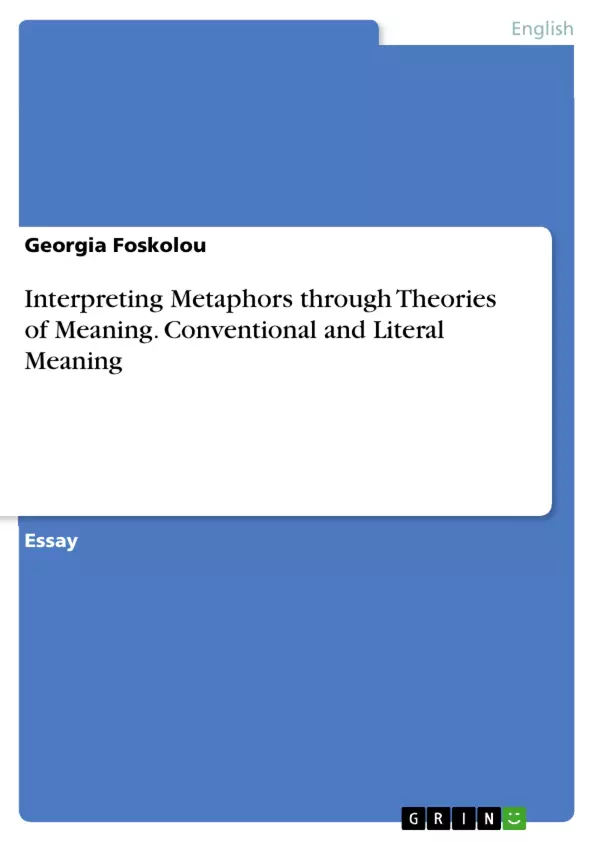This essay discusses the challenges metaphors pose to theories of meaning originating from both the branches of Pragmatics and Semantics. A metaphor is a conventional use of language where one linguistic object, namely a target domain, and the concept behind it is assigned to another linguistic object and the concept behind it, namely a source domain, from which it appears to have borrowed a determined feature even if the two concepts are unlike.
In rhetorics metaphors function as stylistic embellishments to beautify speech and entertain a certain audience for purposes of an ideological effect, such as persuasion or motivation. Namely they have the power to create new prejudices and beliefs and provide a new view of the world.
Inhaltsverzeichnis (Table of Contents)
- 1.1.Introduction to Metaphors
- 1.2. The Features of Metaphors
- 1.2.1. Metaphors as tropes
- 1.2.2. Conventionality issues
- 1.2. 3. Analogical mapping
- 1.2.4. Asymmetry
- 1.2.5. Systematicity
- 1.2.5 Abstraction
- 1.3. The Functions of Metaphors
- 1.3.1. Stylistic and ideological effects
- 1.3.2. Cognitive effects and theory drafting
- 2.1 Theories of meaning
- 2.2. Paper Thesis: The Importance of the Context
- 3.1. The Principles of Compositionality
- 3.2. The challenge metaphors pose to the Principles of Compositionality
- 3.3. How the Principles of Compositionality fail to interpret metaphors
- 4.1. Grice's Principles of Communication
- 4.2. The challenge metaphors pose to Grice's Principles of communication
Zielsetzung und Themenschwerpunkte (Objectives and Key Themes)
This paper investigates the challenges that metaphors pose for various theories of meaning, focusing on how these figurative expressions deviate from conventional semantic and pragmatic interpretations. It aims to demonstrate the importance of context in understanding and interpreting metaphors.
- Metaphors as tropes and their unique features
- The role of conventionality and the distinction between novel and dead metaphors
- The challenges metaphors pose to the Principles of Compositionality
- The limitations of Grice's Principles of Communication in interpreting metaphors
- The significance of context in deciphering the meaning of metaphors
Zusammenfassung der Kapitel (Chapter Summaries)
- Chapter 1.1. Introduction to Metaphors: Defines metaphors as a form of language where one concept is assigned to another, drawing a comparison based on shared features. It presents a simple example of a metaphor and explains the concepts of target domain and source domain.
- Chapter 1.2. The Features of Metaphors: Examines various features of metaphors, including their status as tropes, the role of conventionality, the process of analogical mapping, the asymmetrical nature of comparisons, and the systematicity and abstraction inherent in their construction.
- Chapter 1.3. The Functions of Metaphors: Explores the functions of metaphors, highlighting their stylistic and ideological effects in rhetoric and their cognitive implications in theory development.
- Chapter 2.1. Theories of meaning: Introduces the concept of theories of meaning and their division into semantic and pragmatic theories. It discusses how these theories attempt to explain how humans decode language and interpret meaning.
- Chapter 2.2. Paper Thesis: The Importance of the Context: Presents the thesis of the paper, emphasizing the critical role of context in interpreting metaphors and its implications for semantic and pragmatic theories.
- Chapter 3.1. The Principles of Compositionality: Briefly discusses the Principles of Compositionality, a theory of meaning that suggests the meaning of a sentence is determined by the meanings of its individual words and their arrangement.
- Chapter 3.2. The challenge metaphors pose to the Principles of Compositionality: Explores how metaphors challenge the Principles of Compositionality by introducing non-literal meaning and creating ambiguities that traditional semantic analysis cannot easily resolve.
- Chapter 3.3. How the Principles of Compositionality fail to interpret metaphors: Explains the limitations of the Principles of Compositionality in interpreting metaphors and the need for a more context-sensitive approach.
- Chapter 4.1. Grice's Principles of Communication: Introduces Grice's Principles of Communication, a theory of pragmatic meaning that relies on cooperative principles and conversational implicatures to interpret utterances.
- Chapter 4.2. The challenge metaphors pose to Grice's Principles of communication: Examines how metaphors challenge Grice's Principles of Communication due to their potential for ambiguity, non-literal meaning, and the difficulty in establishing shared understanding between speaker and listener.
Schlüsselwörter (Keywords)
This paper centers on the exploration of metaphors and their impact on theories of meaning. It examines concepts such as conventionality, analogical mapping, systematicity, abstraction, semantic and pragmatic theories, the Principles of Compositionality, and Grice's Principles of Communication, emphasizing the importance of context in interpreting these figurative expressions.
Frequently Asked Questions
What is the difference between a source domain and a target domain?
In a metaphor, a target domain is the concept being described, while the source domain is the concept from which features are borrowed to provide a new perspective or meaning.
How do metaphors challenge the Principle of Compositionality?
The Principle of Compositionality suggests meaning is derived from individual words and their arrangement. Metaphors challenge this by introducing non-literal meanings that traditional semantic analysis cannot fully resolve.
What are Grice's Principles of Communication in the context of metaphors?
Grice's principles rely on cooperative communication and implicatures. Metaphors pose a challenge here due to potential ambiguity and the difficulty of establishing a shared non-literal understanding.
Why is context important for interpreting metaphors?
Context is critical because it helps resolve the ambiguities created by figurative language, allowing the listener to decode the intended meaning beyond the literal definition of the words.
What are the functions of metaphors in rhetoric?
Metaphors function as stylistic embellishments to beautify speech, entertain, and achieve ideological effects such as persuasion or motivation by creating new beliefs.
- Citation du texte
- Georgia Foskolou (Auteur), 2019, Interpreting Metaphors through Theories of Meaning. Conventional and Literal Meaning, Munich, GRIN Verlag, https://www.grin.com/document/498954



